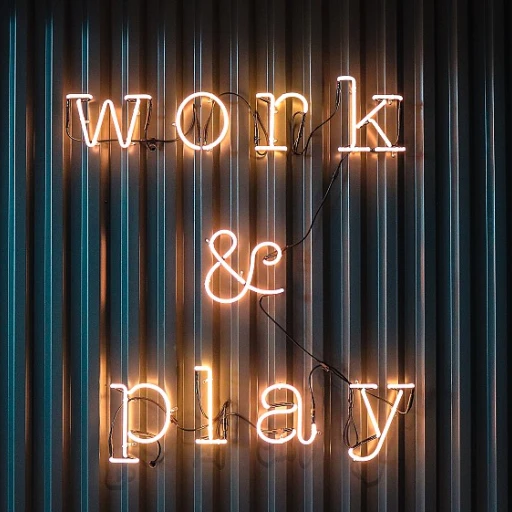Understanding Improvisation in Professional Growth
Embracing Improvisation for Career Progress
In the professional realm, mastering improvisation is akin to jazz musicians perfecting their craft. Just as they tune into the rhythm to create spontaneous melodies, professionals can adopt improvisation to enhance their skills and navigate career challenges. By doing so, they learn to adapt swiftly to unexpected changes and seize opportunities.
Improvisation is not merely about spur-of-the-moment decisions; it is a strategic dance of creativity and expertise. The ability to improvise sharpens one's problem-solving skills and opens up avenues for personal growth. As with learning jazz, which involves understanding chord progressions and gaining fluency in the jazz language, professionals can gain a deeper understanding of their field through improvisation.
In professional growth, the analogies of learning jazz apply remarkably well. Just like jazz improvisers start with foundational music theory and progress through structured practice, individuals can establish a base of knowledge and then improvise to develop their expertise. Chord changes in music offer endless variations, similar to how career advancements present diverse paths. Thus, learning to improvise involves picking up on subtle cues and diligently applying knowledge to varied situations.
Ultimately, developing the art of improvisation will not only enhance your professional skillset but also equip you with the agility needed to thrive in a constantly changing environment. This is an integral step towards reaching professional milestones and fostering a dynamic career trajectory.
The Benefits of Learning Improvisation
Embracing the Jazz Spirit in Skill Building
Diving into the world of jazz can teach us invaluable lessons about the art of improvisation, not only in music but also in professional development. When you start learning jazz, the intricate interplay of melodies, harmonies, and rhythms pushes you to explore new creative frontiers. This mirrors the process of professional upskilling, where improvisation involves adapting skills in real time to meet emerging challenges.
The parallels between jazz and professional growth are notable. Just as jazz musicians engage in ear training to master jazz standards and jazz solos, you can develop your professional ear to pick up industry trends. Learning by ear is not just for musicians; it's a valuable skill in absorbing new information efficiently and in playing an active role in any field. Similarly, practicing with jazz chords and chord progressions can be seen as honing your adaptability to manage chord changes in professional scenarios.
Understanding jazz language can enhance your improvisational skills in skill management. Much like playing jazz, where learning the chord progressions and improvising becomes second nature, the same can be applied in a professional setting. With practice, you'll find that you don't have to play by ear all the time. Instead, you will instinctively know when to improvise and when to follow established protocols.
One of the key benefits of learning jazz improvisation is the development of confidence. When you improvise jazz, the initial hesitation gives way to a more fluid and expressive style. This confidence can be instrumental in professional environments, as it enables you to innovate and problem solve creatively. Furthermore, it helps build resilience, a trait that every professional will benefit from as they navigate complex challenges.
Techniques to Enhance Improvisation Skills
Dive Into the Flow: Techniques for Musical Sequences
To genuinely master improvisation, especially in a musical context, one must delve deep into the essence of jazz improvisation and its offspring. An important step in this journey is embracing the techniques that bridge the gap between structured learning and creative expression. Here's how one can nurture these skills:
- Ear Training: An essential component when you aspire to start improvising proficiently is honing your ear. Ear training not only helps in discerning chord progressions and changes but also elevates your ability to respond in real-time while playing music. Consistent practice in this area will improve your ability to internalize the jazz language, creating a more intuitive approach when you improvise jazz.
- Understanding Jazz Standards: Immersing yourself in a repertoire of jazz standards is imperative for learning jazz. These foundational pieces will help you understand the common chord progressions and musical motifs that define the genre. By familiarizing yourself with these, you'll be better equipped to navigate the jazz chord structures during your improv sessions.
- Jazz Solos and Language: Transcribing jazz solos is an excellent method to absorb the language of jazz. It allows for a deeper comprehension of melodic development and rhythm choices that seasoned jazz musicians employ. Learning by ear from masters can exponentially grow your improvising skills.
- Chords and Progressions: A comprehensive grasp of music theory related to jazz chords and chord progressions offers a solid backbone. Understanding how different chords interplay lets you experiment with different chord changes seamlessly while providing a rich palette from which to draw new ideas.
- Step-by-Step Practice: Start with smaller sections of music to improvise over, gradually increasing complexity as you gain confidence. This gradual approach will not only fortify your ability to play on the spot but also develop your unique voice in music.
These techniques don’t only serve musical ambitions but also offer valuable insights into problem-solving and proactive thinking, applicable in various fields. To further support your journey in mastering these skills, consider crafting an effective upskilling strategy that caters to specific professional needs, thereby integrating creativity with your learning endeavors.
Overcoming Challenges in Improvisation
Navigating and Conquering Common Hurdles
Improvisation in any field requires a blend of creativity and structured knowledge. While mastering jazz improvisation or any improvisational skill, learners frequently encounter barriers that can impede progress. Here’s how you can tackle these common challenges to enhance your improvisation journey:- Fear of Making Mistakes: One of the biggest setbacks for individuals learning to improvise is the fear of hitting the wrong note, whether it’s in music or making an error in professional scenarios. Embrace mistakes as part of the learning process. Each error teaches a valuable lesson that refines your ear and improvisational skills over time.
- Lack of Music Theory Knowledge: Understanding jazz language, chord progressions, and music theory is essential, especially when you want to improvise jazz. Spend time learning music theory and develop a solid foundation in jazz chords to improve your ability to improv and play along with jazz standards.
- Developing the Musical Ear: For jazz musicians, ear training is crucial but often daunting. Regularly practice listening exercises and jazz solos, and try to replicate them. This practice not only improves your ability to recognize jazz chord changes but also enhances your overall musical intuition.
- Overcoming Technical Limitations: Many learners stumble due to a lack of technical dexterity on their instruments. Dedicating time to deliberate practice helps improve your technical skills, allowing you to focus on creating rich musical expressions without being hindered by playing limitations.
- Starting Improvisation: It's easy to feel overwhelmed when beginning. Start small by focusing on simple chord changes, gradually advancing to more complex jazz standards. Remember, even the most prolific jazz musicians began with basic steps before mastering the intricacies of jazz chords and sequences.
Real-World Applications of Improvisation
Practical Use of Improvisation in Various Fields
Improvisation is not just a technique honed by jazz musicians or theatrical performers; it's a versatile skill that extends its benefits across various professional domains. Whether you aim to excel in jazz improvisation with complex chord progressions or seek to enhance your capacity for creative problem-solving in the workplace, improvising holds valuable lessons.
In the musical realm, learning to improvise on jazz standards involves understanding music theory, mastering jazz chords, and practicing ear training. These skills form the foundation required to learn jazz and seamlessly navigate through chord changes. Regular practice and playing jazz solos allow musicians to develop their own jazz language, eventually helping them learn improvise as naturally as speaking.
Beyond music, improvisation can significantly benefit your professional growth. It encourages you to think on your feet, adapt swiftly to unexpected situations, and react to real-time challenges with innovative solutions. This agility in thinking is akin to jazz language, where you don’t rely solely on written notes but rather on intuition and spontaneous articulation.
Consider the corporate world, where fluid and dynamic decision-making is often required. Techniques drawn from improvisation in music—such as attentive listening, understanding non-verbal cues (similar to ear training), and responding creatively—can drive effective leadership and team collaboration.
Learning improvisation also plays a pivotal role in enhancing communication skills. Whether it's delivering a compelling presentation or engaging in an impromptu discussion, the ability to compose thoughts quickly and express them clearly is invaluable. It’s akin to jazz musicians using jazz standards to experiment and eventually create unique interpretations without the need for pre-composed lines.
To harness the potential of improvisation in your career, start by embracing the mindset of continuous learning. Dedicate time to understand the core principles of improvisation, practice diligently, and actively seek opportunities to apply these skills in real-world scenarios, be it in music, business, or any field where adaptability and creativity are prized. The journey of mastering improvisation will not only enhance your professional toolkit but also transform your approach towards personal development.
Resources for Further Learning
Embarking on Your Improvisation Journey with the Right Tools
Transitioning from comprehension of improvisation's essence and its immense contributions to professional development, it becomes pivotal to explore viable resources that can empower your journey. Whether you are freshly discovering improvisation or sharpening established skills, selecting the right tools can offer a structured path forward.
Immersing oneself in improvised settings, such as a jazz ensemble, can significantly enhance your ability to think on your feet, a crucial step toward mastery. In these musical and professional environments, learning to harmonize seamlessly with others is the crux of improvisation. Here are some instrumental resources to aid your journey:
- Online Courses: Platforms like Coursera and Udemy offer comprehensive courses on improvisation and jazz, including both theoretical concepts and hands-on chord practice.
- Jazz Books: Delve into books detailing jazz improvisation and music theory for those passionate about the genre. These texts often discuss chord progressions and jazz language in depth.
- Practice Sessions: Regularly playing with other musicians or joining a jazz club can provide essential feedback and an opportunity to apply your skills in real-time.
- Apps for Ear Training: Apps like EarMaster can enhance your ability to recognize chord changes instantly, aiding in spontaneous musical decisions.
- Listening to Jazz Solos: Spend time analyzing solos from renowned jazz musicians to internalize the fluency and verbal expression of playing jazz.
Learning improvise techniques isn't restricted to musical landscapes alone. Embracing these resources will help equip you to better tackle the artistic improvisational challenges in the professional arena.












